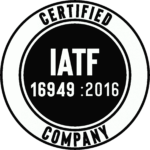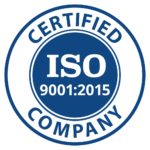Normalizing: Enhancing Steel’s Ductility and Toughness for Reliable Performance
At SIMIC Manufacturing, we offer normalizing, a critical heat treatment process that enhances the properties of steel and other ferrous metals. Normalizing improves ductility, reduces brittleness, and refines the microstructure, making it an essential step for achieving toughness in components that require high-performance under stress.
The Normalizing Process
Normalizing involves reheating a material to a temperature above its critical transformation point, followed by air cooling to refine the grain structure and relieve internal stresses. This process is typically performed on steel and other ferrous alloys after casting, forging, or cold rolling.
Key Steps in the Normalizing Process:
- Heating: The metal is heated to a temperature slightly above the critical re-crystallization point, usually between 810°C to 930°C, depending on the alloy. This temperature allows the grains to become finer and the material to become more uniform in structure.
- Soaking: The metal is held at this temperature for a sufficient period to allow the internal structure to adjust and refine.
- Cooling: After soaking, the component is air-cooled to room temperature. This slow cooling process enables the metal to recrystallize, resulting in a tougher and more ductile material.
Benefits of Normalizing
- Improved Ductility: Normalizing enhances the material’s ductility, reducing brittleness and making it more suitable for forming and machining.
- Refined Grain Structure: The process refines the grain structure of the metal, resulting in fewer impurities and inclusions, leading to better mechanical properties.
- Enhanced Toughness: Normalized components exhibit greater toughness, making them more resistant to impact and fatigue.
- Uniform Properties: Normalizing reduces internal stresses and produces a more uniform material, which is critical for precision applications.
- Cost-Effective: Compared to other heat treatment processes like annealing, normalizing is a relatively cost-effective solution, especially when performed after casting or forging.
Applications of Normalized Steel and Ferrous Alloys
Normalized steel and ferrous alloys are widely used in industries where toughness, machinability, and resistance to fatigue are crucial. Some key applications include:
- Automotive: Gears, axles, crankshafts, and other critical automotive components that must withstand stress and wear benefit from normalizing.
- Aerospace: Aircraft engine parts, landing gear components, and structural elements require normalizing to ensure toughness and fatigue resistance.
- Industrial Machinery: Parts such as shafts, gears, and heavy machinery components are normalized to enhance their durability and resistance to impact and wear.
- Oil & Gas: Components exposed to high pressure and abrasive environments, such as valve bodies and pipe fittings, are often normalized to ensure long-term performance.
- Construction: Steel used in construction, including beams, structural supports, and other heavy-duty applications, benefits from normalizing for improved toughness and durability.
Why Choose Normalizing at SIMIC Manufacturing?
At SIMIC Manufacturing, we specialize in precise normalizing services tailored to your specific component requirements. Our controlled process ensures that your parts achieve superior toughness, reduced brittleness, and a refined microstructure, improving both their performance and longevity.
Our team of experts uses advanced heat treatment technologies to achieve consistent and reliable results. Whether you’re working with steel for automotive, aerospace, industrial machinery, or other applications, we are dedicated to enhancing the performance of your parts through expert normalizing.
Contact SIMIC Manufacturing
For more information on our normalizing services or to request a quote, please contact SIMIC Manufacturing today. Let us help you enhance the durability and performance of your components with our advanced heat treatment solutions!



